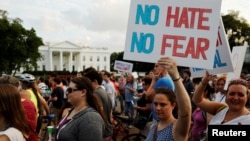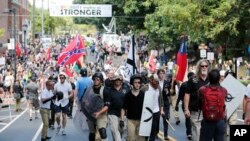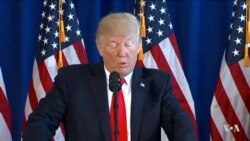President Donald Trump is under attack across the U.S. political spectrum for his failure to denounce the white supremacists who staged the "Unite the Right" rally in Charlottesville, Virginia, that turned deadly.
Trump, often quick to comment on terrorist attacks, condemned "this egregious display of hatred, bigotry and violence on many sides" that resulted in one death and 19 injuries in the midst of the street violence and the deaths of two state police troopers killed in a helicopter crash linked to the rally. In Twitter remarks, he offered condolences for the three who lost their lives and "best regards to all those injured."
But Trump did not condemn the extremist groups who organized Saturday's protest, many of them his political supporters who openly derided racial minorities, Jews and women with signs and chants. David Duke, a one-time leader of the racist Ku Klux Klan in the United States, said the rally about 160 kilometers southwest of Washington was a "turning point" for a movement to "fulfill the promises of Donald Trump."
During his run for the presidency last year, Trump disavowed Duke's support. On Sunday, the White House sought to clarify Trump's failure on Saturday to denounce the white nationalist groups by name, saying that he condemns "all forms of violence, bigotry and hatred" and "of course that includes white supremacists," the racist Ku Klux Klan and "all extremist groups."
In Pictures: Virginia City Rocked by White Nationalist Protests
Richard Spencer, a leader of the "alt-right" extremist movement in the United States, led hundreds of supporters at the rally in a Nazi salute as they shouted, "Hail Trump, hail our people, hail victory!"
Obama on events
Former President Barack Obama and Trump's Democratic election opponent, former U.S. Secretary of State Hillary Clinton, both condemned the hatred at the heart of the white supremacist movement, as did numerous Republican lawmakers who normally are politically aligned with Trump.
Obama, in a Twitter remark, quoted anti-apartheid revolutionary Nelson Mandela's 1994 autobiography, Long Walk to Freedom, noting his treatise that "People must learn to hate, and if they can learn to hate, they can be taught to love, for love comes more naturally to the human heart than its opposite."
Clinton tweeted, "The incitement of hatred that got us here is as real and condemnable as the white supremacists in our streets. Every minute we allow this to persist through tacit encouragement or inaction is a disgrace, & corrosive to our values."
Democratic National Party chairman Tom Perez said, "America is no place for bigots. And to be silent in the face of their hatred is to condone it. That's why it is on all of us to stand up to these reprehensible acts and speak out against white supremacy. We cannot allow a group of cowards instill fear in our communities."
Republican reactions
Republican Senator Cory Gardner of Colorado wrote, "Mr. President — we must call evil by its name. These were white supremacists."
Utah Republican Senator Orrin Hatch, tweeted, "We should call evil by its name. My brother didn't give his life fighting Hitler for Nazi ideas to go unchallenged here at home."
Florida Senator Marco Rubio, who lost the Republican presidential nomination last year to Trump, wrote on Twitter that it was important “for the nation" for Trump to describe the Charlottesville events "for what they are, a terror attack by #whitesupremacists."
While Trump ignored reporters' questions about what he thought about the white supremacists who staged the rally, two of his faith advisers were not reticent in attacking them.
Minister Samuel Rodriguez, who took part in Trump's presidential inauguration, said, "I condemn the forces of white nationalism, white supremacy and anti-Semitism that divide our country today and I also condemn those who seek to politicize it all for their political gain. Unless, we bridge this senseless and partisan divide there will be more horrors to come. It's on each of us to be a part of the solution and it begins with turning our political swords into plowshares. We must begin to work together to heal our nation."
Ronnie Floyd, senior pastor at an Arkansas church and a member of Trump's evangelical advisory board, said the white nationalists at Saturday's rally did not "represent in any form or way the Christian faith or the values followers of Jesus stand for. In fact, white nationalism and white supremacism are anathema to the teachings of Christ, who called us to love and to serve our neighbor, regardless of skin color, gender or religion, to give up our life for our friends and to even love our enemies."
At one point Saturday, Trump tweeted that everyone "must be united & condemn all that hate stands for." But Duke grew angry at the remark, sensing that it was critical of the white nationalist movement.
Duke responded via Twitter, telling Trump to "take a good look in the mirror & remember it was White Americans who put you in the presidency, not radical leftists."
At a news conference at his golf resort in Bedminster, New Jersey, Trump was asked, "Mr. President, do you want the support of these white nationalist groups who say they support you, Mr. President, have you denounced them strongly enough?" one reporter shouted.
"A car plowing into people, would you call that terrorism, sir?" another asked.
Without answering, Trump walked out of the room.







